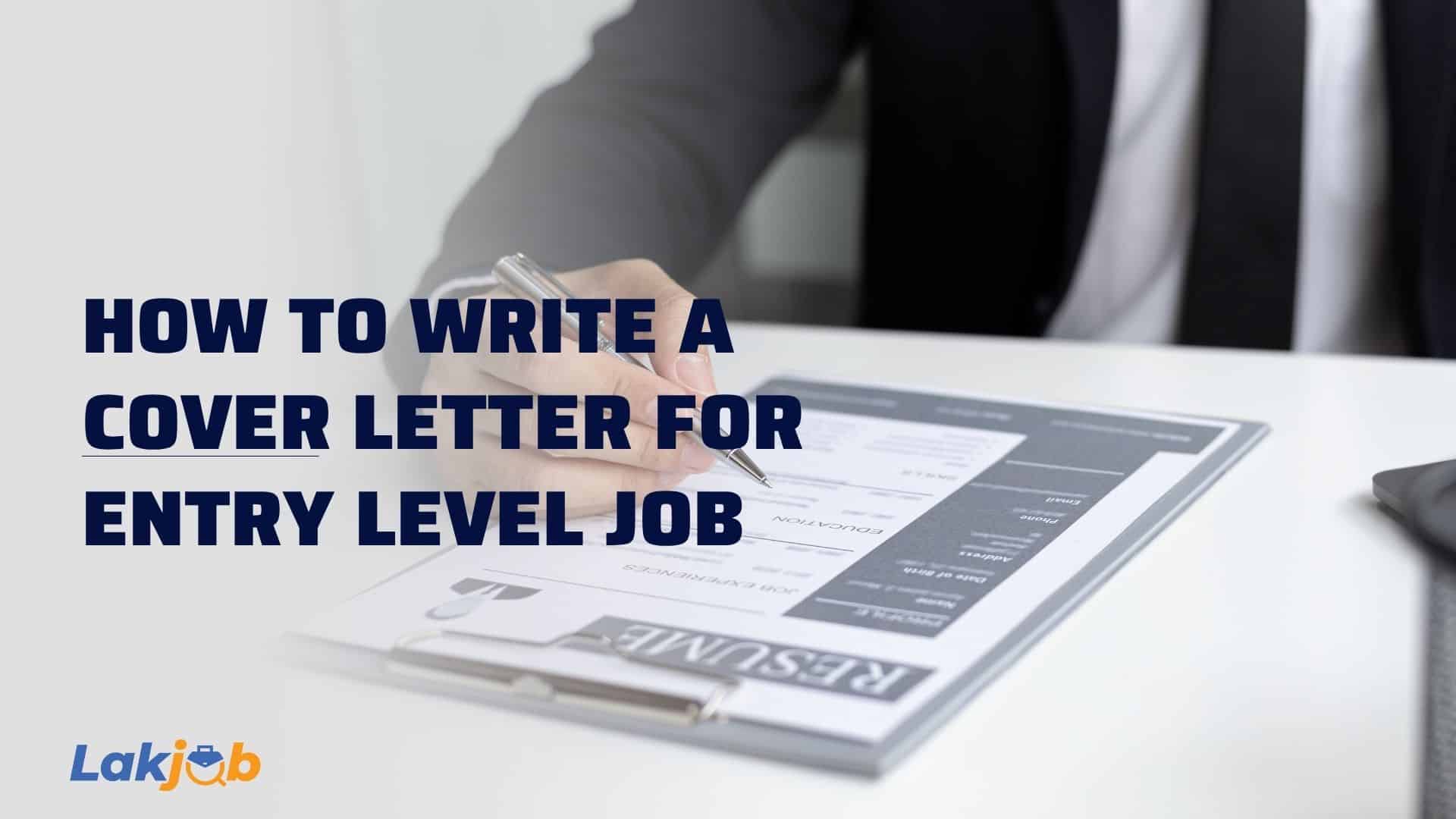Stepping into the U.S. job market can feel like navigating a competitive landscape, especially when you’re aiming for an entry-level position with limited formal work experience.
You’ve poured effort into crafting a compelling resume, but what about that often-dreaded companion document: the cover letter? Many job seekers, particularly recent graduates or students, view it as an optional formality or a mere repetition of their resume.
However, for entry-level roles, a well-crafted cover letter is your secret weapon.
It’s your opportunity to tell your unique story, bridge any perceived experience gaps, and directly communicate your enthusiasm and fit for the role and the company.
This guide will empower you to write a compelling cover letter that transforms your potential into a powerful first impression, opening doors to interviews and your first professional role in the United States.

Your Cover Letter: The Unsung Hero of Your Job Application
In a sea of resumes, a personalized cover letter acts as your voice, allowing you to connect with the hiring manager on a more personal level.
It’s not just a formality; it’s a strategic tool, especially when you’re applying for entry-level positions.
Why It’s Indispensable for Entry-Level Roles
For recent graduates and students, your resume might not yet boast a long list of impressive job titles.
This is precisely where your cover letter shines. It allows you to:
- Tell Your Story: Explain your unique journey, motivations, and how your non-traditional experiences (academics, volunteer work, projects) have prepared you.
- Showcase Personality & Enthusiasm: Convey your passion for the role and the company in a way a resume cannot. This helps recruiters gauge your cultural fit.
- Bridge Experience Gaps: Directly address how your transferable skills, gained through various avenues, align with the job requirements, even if you lack direct work history.
- Demonstrate Communication Skills: A well-written cover letter immediately proves your ability to communicate clearly, concisely, and professionally – a highly sought-after soft skill.
- Gain a Competitive Edge: Many applicants skip the cover letter or submit a generic one. A tailored, impactful letter immediately sets you apart from the competition.
Insight: While some online application systems mark cover letters as “optional,” data from career experts consistently shows that recruiters appreciate them.
A 2023 survey by ResumeLab found that 83% of recruiters consider cover letters important, and 45% would reject an application without one, even if it’s optional.
Don’t miss this opportunity to make a strong impression.
The Anatomy of a Winning Entry-Level Cover Letter
A powerful cover letter follows a standard structure, but each section offers a unique opportunity to highlight your strengths.
1. Your Contact Information & Date
This section should mirror the professional header of your resume.
- Your Full Name
- Your Phone Number
- Your Professional Email Address
- Your LinkedIn Profile URL (ensure it’s updated and professional)
- Your City, State (full address is generally not necessary)
Date:
- The date you are writing the letter.
Recipient’s Contact Information (if known):
- Hiring Manager’s Name (if you can find it)
- Hiring Manager’s Title
- Company Name
- Company Address
Actionable Tip: Always try to find the hiring manager’s name. Check the job posting, LinkedIn (search for the company and job title), or the company’s website.
Addressing a specific person shows initiative and attention to detail. If you cannot find a name, use a professional general salutation like “Hiring Manager” or “Hiring Team.”
2. The Salutation: Making a Personal Connection
- Best Practice: “Dear Mr./Ms. [Last Name of Hiring Manager],”
- If Name Unknown: “Dear Hiring Manager,” “Dear [Department Name] Hiring Team,” or “Dear [Company Name] Team,”. Avoid generic “To Whom It May Concern.”
3. The Opening Paragraph: Hook Them Immediately
This paragraph should be concise, enthusiastic, and immediately state your purpose.
- State the Position: Clearly mention the exact job title you’re applying for.
- Express Enthusiasm: Convey genuine excitement for the role and the company.
- Mention Where You Found It: (Optional, but can be a nice touch) LinkedIn, company website, university career fair, etc.
- Briefly State Your Core Value Proposition: A quick, compelling reason why you’re a strong candidate, even without extensive experience.
Example Opening: “I am writing with immense enthusiasm to express my interest in the Entry-Level Marketing Assistant position at [Company Name], as advertised on [Platform where you saw the ad]. As a recent Communications graduate with a proven ability to create engaging digital content and a deep passion for innovative marketing strategies, I am eager to contribute my skills to your dynamic team.”
4. The Body Paragraphs: Telling Your Story & Bridging Gaps
This is where you connect your unique background to the job requirements, directly addressing any perceived lack of formal experience by focusing on your transferable skills and relevant achievements. Aim for 1-2 strong paragraphs.
- Paragraph 1: Skills Match & Evidence
- Identify 1-2 key skills from the job description that you possess.
- Connect these skills to your non-traditional experiences. This is where your academic projects, volunteer work, extracurricular activities, or part-time jobs become your “experience.”
- Use the STAR method (Situation, Task, Action, Result) in a concise way. Don’t just state the skill; show how you used it and what the outcome was.
- Quantify achievements whenever possible.
- Paragraph 2: Company Fit & Enthusiasm
- Research the company thoroughly. Go beyond their “About Us” page. Look at their recent projects, news, values, company culture, and even their social media presence.
- Explain why you want to work for this specific company and this specific role. Avoid generic statements.
- Connect your personal values or aspirations to their mission. Show genuine interest and demonstrate you’ve done your homework.
5. The Closing Paragraph: Your Call to Action
This paragraph should reiterate your interest, express eagerness for an interview, and thank the hiring manager.
- Reiterate Interest: Briefly restate your enthusiasm for the position.
- Call to Action: Clearly state your desire for an interview.
- Thank Them: Express gratitude for their time and consideration.
Example Closing: “Thank you for considering my application for the Entry-Level Marketing Assistant position.
I am very enthusiastic about the opportunity to discuss how my skills and passion can contribute to [Company Name]’s continued success.
I look forward to hearing from you soon to schedule an interview.”
6. Professional Closing & Signature
- Professional Closing: “Sincerely,” “Respectfully,” or “Best regards,”
- Your Typed Full Name
- (Optional) Your Signature: If sending a physical letter.
Translating Potential into Proof: What to Write When You Have “No Experience”
The biggest challenge for entry-level applicants is often articulating their value without a traditional work history.
The key is to shift your focus from what you lack to what you possess: transferable skills and relevant experiences from non-traditional sources.
Focus on Transferable Skills
These are the abilities you’ve developed through various life experiences that are highly valued in any professional setting.
- Communication: Public speaking, persuasive writing, active listening, presentation skills, cross-cultural understanding.
- Problem-Solving: Critical thinking, analytical reasoning, research, troubleshooting, creative solutions.
- Teamwork & Collaboration: Group projects, leadership roles, conflict resolution, consensus building, peer mentoring.
- Leadership: Guiding groups, delegating tasks, motivating others, taking initiative.
- Adaptability: Learning new software quickly, thriving in new environments, handling unexpected challenges, embracing change.
- Technical Proficiency: Software skills (Microsoft Office Suite, Google Workspace, specific industry software), coding languages, data analysis tools, social media management.
- Time Management & Organization: Meeting deadlines, prioritizing tasks, planning events, managing multiple responsibilities.
Leverage Non-Traditional Experience
Every significant activity you’ve undertaken has likely equipped you with valuable skills.
- Academic Projects: These are goldmines. Detail the project’s goal, your specific role, the skills (technical or soft) you used, and the quantifiable outcomes.
- Example: “Developed a Python-based data visualization tool for a university research project, streamlining data interpretation for a team of 5 and reducing analysis time by 10%.”
- Volunteer Work: Demonstrates initiative, community involvement, teamwork, and often specific skill application.
- Example: “Organized weekly food distribution events for a local shelter, coordinating 15+ volunteers and ensuring timely delivery of over 500 meals monthly.”
- Extracurricular Activities & Leadership Roles: Showcases teamwork, leadership, event planning, communication, and commitment.
- Example: “As President of the Debate Club, I led weekly meetings for 20+ members, organized inter-collegiate competitions, and mentored junior members, improving overall team performance by 15%.”
- Part-Time & Summer Jobs: Even if seemingly unrelated (retail, food service), these roles build crucial transferable skills.
- Example: “Provided exceptional customer service in a high-volume retail environment, consistently resolving customer inquiries and processing an average of 70 transactions daily with 98% accuracy.”
- Personal Projects/Portfolios: For creative or technical fields, these prove your passion, initiative, and practical skills.
- Example: “Designed and launched a personal portfolio website using Squarespace and custom CSS, attracting 500+ unique visitors in the first month and showcasing 10+ graphic design projects.”
Quantify Everything
Numbers add credibility and impact. Even for non-paid roles, find ways to quantify your contributions.
- Instead of “Helped organize events,” try “Coordinated logistics for 5 university events, attracting over 500 attendees.“
- Instead of “Managed social media,” try “Increased Instagram followers by 20% over 3 months through daily content posting and engagement.“
Tailoring & Targeting: The Key to Standing Out
A generic cover letter is a wasted opportunity. The most effective cover letters are meticulously tailored to each specific job and company.
1. Research is Paramount
Before you write a single word, immerse yourself in research:
- Company Website: Understand their mission, vision, values, products/services, and recent news.
- LinkedIn: Explore the company’s page, look at employee profiles (especially those in roles you’re applying for), and identify the hiring manager.
- Recent News/Press Releases: Find out about their latest achievements, challenges, or initiatives.
- Glassdoor/Indeed: Read employee reviews to get a sense of company culture.
2. Deconstruct the Job Description
This is your cheat sheet. Read it carefully, highlighting:
- Required Skills & Qualifications: These are non-negotiable.
- Preferred Skills: These are your bonus points.
- Keywords: Note recurring terms or phrases.
- Company Culture Clues: Look for words describing the ideal candidate (e.g., “collaborative,” “innovative,” “fast-paced”).
3. Personalize Every Letter
- Address by Name: Always try to find the hiring manager’s name.
- Specific Examples: Refer to specific company projects, values, or recent news in your body paragraphs.
- Mirror Language: Subtly use some of the same keywords and phrases from the job description in your letter.
Actionable Tip: Think of your cover letter as a conversation. You wouldn’t have the same conversation with everyone. Each letter should feel unique to the recipient.
Common Cover Letter Mistakes to Avoid (and How to Fix Them)

Even with the best intentions, common pitfalls can derail your cover letter. Be vigilant!
- Mistake 1: Being Generic.
- Fix: Tailor every letter. Refer to the specific job title and company. Research their work and mention something specific that excites you.
- Mistake 2: Typos and Grammatical Errors.
- Fix: Proofread meticulously. Read it aloud. Use grammar checkers. Ask a trusted friend or career counselor to review it. A single error can signal a lack of attention to detail.
- Mistake 3: Repeating Your Resume Verbatim.
- Fix: Your cover letter expands on your resume. It tells the story behind the bullet points. Choose 1-2 key achievements from your resume and elaborate on them, focusing on the how and why they are relevant to this specific role.
- Mistake 4: Being Too Long or Too Short.
- Fix: Aim for three to four concise paragraphs on a single page. Recruiters are busy. Get to the point quickly and make every sentence count.
- Mistake 5: Focusing Only on “Me, Me, Me.”
- Fix: Shift the focus to “what I can do for you (the company).” While you highlight your skills, always frame them in terms of how they benefit the employer and contribute to their goals.
- Mistake 6: Sounding Unenthusiastic or Overly Formal.
- Fix: Use a warm, professional tone. Let your genuine interest shine through. Avoid overly stiff or robotic language.
- Mistake 7: Over-explaining Your Lack of Experience.
- Fix: Don’t apologize for not having experience. Instead, confidently pivot to what you do have: your transferable skills, relevant academic projects, volunteer work, and eagerness to learn. Frame it as “I am ready to apply my [skill] gained from [experience] to your team.”
Conclusion

Writing a compelling cover letter for an entry-level job, especially when you’re a recent graduate, is a powerful skill that can significantly boost your job search.
It’s your chance to move beyond the bullet points of your resume and tell a personal story of your potential, passion, and readiness to contribute.
By understanding its purpose, mastering its structure, effectively translating your non-traditional experiences into valuable skills, and meticulously tailoring each letter, you transform a perceived weakness into a formidable strength.
Embrace the cover letter as your unique opportunity to make a memorable first impression.
It demonstrates your communication skills, showcases your initiative, and proves your genuine interest in the role and the company.
Arm yourself with this essential tool, approach each application with confidence and purpose, and you will undoubtedly open the doors to exciting entry-level opportunities in the U.S. job market.
Your journey is just beginning, and with a well-crafted cover letter, you’re already one step closer to success.
F.A.Q
Q1: Is a cover letter really necessary for an entry-level job if it’s optional?
A1: While often labeled “optional,” a strong cover letter is highly recommended, especially for entry-level positions. It’s your prime opportunity to tell your unique story, explain how your non-traditional experiences (academics, projects, volunteer work) translate into valuable skills, and demonstrate genuine enthusiasm for the specific role and company. Many recruiters value them as a sign of strong communication skills and initiative.
Q2: What’s the most important thing to include in an entry-level cover letter?
A2: The most important aspect is to connect your transferable skills and relevant non-traditional experiences directly to the job requirements. Don’t just repeat your resume. Instead, choose 1-2 key skills mentioned in the job description and use concise examples (from academic projects, volunteer work, or part-time roles) to show how you’ve applied them and achieved results.
Q3: How long should an entry-level cover letter be?
A3: An entry-level cover letter should be concise and to the point, ideally fitting on a single page. Aim for three to four well-structured paragraphs: an opening, one or two body paragraphs connecting your skills to the role, and a strong closing. Recruiters have limited time, so make every sentence count.
Q4: Should I address the cover letter to a specific person if I don’t know the hiring manager’s name?
A4: Always try your best to find the hiring manager’s name through research (job posting, LinkedIn, company website). If you absolutely cannot find a name, use a professional general salutation like “Dear Hiring Manager,” “Dear [Department Name] Hiring Team,” or “Dear [Company Name] Team.” Avoid outdated or overly generic greetings like “To Whom It May Concern.”
Q5: How can I show enthusiasm without sounding desperate or unprofessional?
A5: Show genuine enthusiasm by demonstrating you’ve done your research on the company and the role. Mention specific company projects, values, or recent achievements that resonate with you. Connect your personal aspirations to their mission. Use positive, active language, but maintain a professional tone. Avoid excessive exclamation points or overly informal language.
I specialize in managing and auditing end-to-end HR functions, ensuring full compliance with state and federal regulations. I partner with leadership to drive strategic HR initiatives and implement necessary changes. My core strength lies in identifying, hiring, and training top talent to enhance team performance and support organizational growth.






